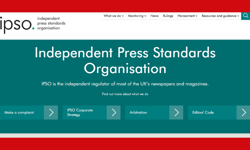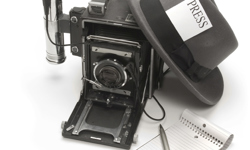Earlier this year, Francesca Gillett and Simon Murfitt both won awards for their excellence in ‘senior’ examinations held by the National Council for the Training of Journalists (NCTJ).
Gillett, aged 25, a reporter with the South Wales Argus in Newport, won the Esso award for the ‘best news report’ exam. She studied for a postgraduate diploma in Newspaper Journalism at Cardiff, and joined the Newsquest-owned daily in 2014. Murfitt, aged 24, a reporter with the Brentwood Gazette, won the Society of Editors’ award for the ‘best news interview’ exam. He studied for a BA (Hons) in Print Journalism at Nottingham Trent University, and joined what was then a Local World-owned weekly in 2014. The paper’s now owned by Trinity Mirror.
Q: What made you enter journalism?
Gillett: A gradual realisation that journalism was the only job which would feel least like a job, closest to a hobby and one I’d really enjoy. I love writing, finding out and communicating information, and listening to people’s stories. I also love news and current affairs. I quickly got used to hearing “print is on its way out” and, if anything, this made me want to do it quicker, as if print’s really on its way out, I want to make the most of it while I can.
Murfitt: I’d always enjoyed writing and being a massive football fan at first thought I wanted to do sports journalism. But I chose not to do a degree in sports journalism to keep my options open. When I graduated, I still wasn’t 100% sure what I wanted to go into so just applied for loads of different jobs, had a couple of interviews and ended up at the Brentwood Gazette.
Q: What were the most useful skills you learned on your course?
Gillett: Fact checking, and how to write tight copy. And when doing interviews, always think through what someone’s telling you and the chronology of their story to make sure you don’t miss asking important questions. Everything I was taught about search engine optimisation and sharing stories on social media was incredibly useful. We received training on producing video, which was helpful, but more on that would’ve been good. I also wasn’t prepared for how important pictures are, but soon learnt that on the job.
Murfitt: Shorthand. Having two years to learn it, rather than the short time colleagues on fast-track NCTJ courses had, was good. Also law and public affairs, over three years, meant I started my job with sound legal and local government knowledge.
Q: What’s the first and last news you read each day, and how do you consume it?
Gillett: The first things are Twitter, BBC news and Facebook. If I have time, I’ll read some Guardian online and BuzzFeed, then my own paper’s website. I read all this from my phone over breakfast. I’d say my daily news diet is 50% digital, on computer or phone. The other 50% is probably broadcast: up to an hour of BBC Radio 4’s Today programme, then fifteen minutes of BBC Radio 1 newsbeat on the way home. In the evenings, either BBC news online or Guardian online, Twitter and BuzzFeed – all on my phone.
Murfitt: I don’t really have a routine, more just whatever pops up on Twitter that’s interesting, normally from national papers’ websites or on sites like Vice. I read the Guardian app on my phone and read features and comment pieces to break up the news a bit.
Q: What’s your most important source of stories?
Gillett: Social media, especially Facebook. Although a lot of stories still come from talking to people on my patch and people contacting the paper, some of the best come from Tweets or Facebook posts. You can’t beat face-to-face, though, for getting good stories and building up good rapport with contacts.
Murfitt: Talking to contacts on the phone or via email, although social media is increasingly a good source of off-diary stories. We still have lots of people phone or email with stories, but a lot of people’s immediate reaction after something happens is to take to Facebook or Twitter rather than phone their local paper.
Q: What’s the best story you’ve broken? Where did you get it from, and how did you break it?
Gillett: One about a local community council being investigated for financial wrongdoing – because I got that from a contact in my patch who came to me first. Stories I've got from my patch through contacts always seem fulfilling, as you feel like you've dug it out like a traditional journalist. Other stories would be: tributes to a woman who’d been murdered, which I got completely from social media by contacting her family; interviewing the partner of a murder victim (approached after court); and a video I found of free runners sliding down the tallest bridge in Newport. I got hold of their video and it did so well online. All the above were broken online.
Murfitt: The best story was an exposé of a local heritage railway that hired out its venue to film a porn movie. We found out thanks to good sources in the week before our paper’s next edition, and held it back from our website so we didn’t give rivals the chance to publish it before it went in our paper. It’s unlikely we’d do that now, as we’ve moved to a web-first system.
Q: What proportions of your time are spent on print and online? Is the balance right?
Gillett: It’s hard to say as everything normally goes on the web first. I personally feel I’m writing for online. When I’m out on a job, I’ll always think first about how I can take pictures, videos and vines to make it interesting for the web. I only really think about print in relation to the word-count I need to file. The focus on digital is about right as beating other news organisations is done online.
Murfitt: When I first started, at least 80% of time was on print, with the odd web story. That’s changed massively, and now the majority of time is on the website. With Trinity Mirror’s takeover of Local World, we’re changing to a ‘Newsroom 3.1’ system which is completely web-first, sub editors then pulling together the best bits for the paper. We’re yet to see how that plays out, but one positive will be reporters not worrying as much about the two mediums, just focusing on the best stories. Critics suggest we may lose some content which might not get as many hits online but is still of interest to the print audience. The counter argument is that it’s still possible to make those stories work online but they may have to be handled differently, then altered for the paper.
Q: Apart from writing stories, what else do you deliver?
Gillett: I’ll take as much video and photos as is suitable and needed. I also love doing vines and tweeting from a breaking news story. I’ve done a few videos which I’ve edited myself, some with voiceovers, but most just simple panning videos, of crash scenes for example. I’m always on the lookout for videos and photos which are popular on social media.
Murfitt: Full-time photographers have now departed since Trinity Mirror’s takeover, but we’ve gone to a freelance system so most pictures are taken by professional snappers. Reporters have to take the odd posed pictures for the paper, and will take pictures and video of breaking news stories like serious crashes and crime scenes. More emphasis is on video, so reporters are increasingly having to think about video interviews using phones.
Q: What’s your view of the changing audience – with less papers sold, but more clicks online? And if digital remains free, how can high-quality journalism be financed?
Gillett: It’s easy to talk of doom and gloom, especially when there sadly are cuts and people losing their jobs. But personally I think it’s exciting to be a journalist working online. When a news story breaks, you can get so much content, pictures and videos within minutes just sitting at your computer. Although I love going out on jobs and producing video and pictures, it’s great to gather lots of different content so fast. In some ways, clicks online make you feel your stuff’s being read – there’s that immediacy where you can watch the numbers grow and know people are interested. You don’t get that with print. It’s also a lot more competitive and exciting as you want to get your content online before other news organisations. Re finance, I don’t know. Advertising’s an obvious answer – even if websites suffer because of the enormous banners around the side and videos in the middle of the story which interrupt everything and slow sites down. I like the idea of Blendle in Holland – a website which collates stories from a range of news sites and charges people per article. It would only really work with agreement across the board from news organisations, but it could work to charge people for more in depth pieces, like the Guardian’s ‘long reads’.
Murfitt: Anyone would be lying if they said they weren’t at least a bit worried about declining sales, as newspapers still make the vast majority of money, compared to digital revenue. However, I’m optimistic there will always be a market for high quality, trustworthy news and therefore advertisers will be more inclined to spend with the best news organisations.
Q: Will newspapers still be around in 2026? How different might they be, and what will your job become?
Gillett: A lot of print newspapers will have closed and remain just as digital editions. Most regionals will have gone online too and stopped their print versions. Some will continue to do well – for example, hard copies for Tube commuters. My job will be more about scouring social media for videos and pictures which do well online. It could get harder for journalists to have ownership of stories, with big announcements going on social media directly and being shared.
Murfitt: Printed newspapers will still be around, although it’s hard to see small local papers surviving much longer. With less revenue, media companies won’t be able to employ enough staff to cover small areas in detail. The sales of big regional and national titles will continue to decline and some may move from daily to weekly. But I think the print title still offers a different reading experience and the market will still be around for some time. There’ll still be reporters but with increased expectations in terms of output, sizes of area to cover, and requirements to shoot video, take pictures, and social media.
Q: What would you advise student journalists to prioritise?
Gillett: Build up a big social media presence, including a big Twitter following. Learn as many video skills as you can. Experiment with vine and video-editing software. Even try voice training if you can to deliver good voiceovers and interviews on camera. But prioritising traditional skills – shorthand, fact-checking, media law, interviewing – is incredibly important.
Murfitt: New skills like video capture and editing, and other broadcast techniques. Get involved in student media – radio, TV, magazine; it’ll all be worthwhile when applying for jobs. Make sure you learn shorthand if you want to go into newspapers – it’s a great skill that will set you apart and is still the only way to cover court. If you’re serious about journalism, make sure you get onto an NCTJ-accredited course (or the BCTJ for broadcast). That meant I was able to go straight into a job at 21 rather than taking another course afterwards. NCTJ skills were probably more important than my degree and will make getting your senior qualifications a lot easier.












